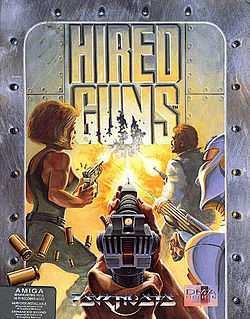Hired Guns
| Hired Guns | |
|---|---|
 Cover art of Amiga version. | |
| Developer(s) | DMA Design |
| Publisher(s) | Psygnosis |
| Designer(s) | Scott Johnston and Steve Hammond |
| Platform(s) | Amiga PC |
| Release date(s) | 1993 |
| Genre(s) | RPG |
| Mode(s) | Single-player Multiplayer |
| Distribution | 5 3.5" floppy disks, hard drive installable |

Hired Guns is a role-playing video game produced by DMA Design (distributed by Psygnosis) for the Amiga and the PC in 1993.[1] The game is set in the year 2712, in which the player controls four mercenaries selected from a pool of twelve. One of the features of the game is that all four characters are on screen simultaneously, each in their own window.
Plot
A hostage rescue mission on the planet Graveyard proves to be illusory and that they have actually been lured into a weapons proving ground, in order to pit genetically engineered creatures against them to see how they fare.
Gameplay
The game uses a system of four simultaneous Dungeon Master-style first-person perspective viewpoints in the world. Each character is individually controllable and occupies their own square, unlike Dungeon Master, in which the entire party occupies the same square. Each character can be made to follow another character, simplifying large group movements when only one player is controlling the party. The gameplay was advanced for its time, allowing up to four players to play simultaneously, using mouse, keyboard or (modified) Sega Mega Drive joypad, with a parallel port adaptor allowing four joypads/joysticks to be used at once.
The game area is in real 3D, and monster/enemy AI have free movement around each level environment. This is unlike other games of its time, in which enemies cannot pursue characters up stairs. An array of light and heavy weapons (including robot sentries, similar to those seen in Aliens Special Edition), incendiary devices, mines and grenades can be used to take out the enemy (or friends!) either on the same level as the player or below.
Players have to manage their inventory, too, as the combined weight of the items in a character's inventory is limited by his/her/its carrying capacity. If this limit is exceeded the message "Too heavy!" will be displayed on the character's viewpoint and he/she/it may not add anything more to the inventory until enough items have been discarded or consumed to bring the total weight below his/her/its carrying capacity again. There are no other penalties on movement or actions for carrying too heavy a load.
Different characters have different carrying capacities. E.g. a heavy combat droid can lug around more weight than a human female.
Also included are devices called "Psionic Amps" that can be used to create strange effects on the player or on the world around them — e.g. one type of Psionic Amp can be used underwater to create an area of air so human characters can breathe.
Underwater areas affect gameplay in two mayor ways: Human characters will drown if they stay under for too long while weapons and equipment will take damage at varying rates until they are destroyed outright. Energy weapons are particularly susceptible to water damage and most types will be destroyed in mere seconds unless protected by a suitable psionic amp which must be activated before entering the water. Neither robotic nor human characters can swim, but are relegated to walking around on the bottom in the same manner as on land.
Amiga Power
The British Amiga games magazine Amiga Power (AP) had a long running gag about Hired Guns. Nearly all games magazines, AP included, have a Next Month page, which offers a brief insight into the contents of next month's issue. However, for AP's first 30 issues or so, they had a thin strip on the back cover upon which they wrote a few lines on next month's issue, and included a very small screenshot of an upcoming game.
This enabled them to have a running joke for several months regarding Hired Guns. For several months, the game failed to arrive for review, as the publishers kept moving the release date back. In response, Amiga Power put the same screenshot of the game on their Next Month Strip every month for about six months, with repeated humble reassurances to the reader that they might, possibly, have it by next month.
When the game did finally arrive, the screen remained in the Next Month strip along with a line of text jokingly suggesting that it was stuck there and nobody knew how to remove it.
References
- ↑ Barton, Matt (2007-02-23). "Part 2: The Golden Age (1985-1993)". The History of Computer Role-Playing Games. Gamasutra. Retrieved 2009-03-26.
External links
- Hired Guns Operations Centre, a polish Hired Guns fan site
- Hiered Guns complete video play-through at RecordedAmigaGames